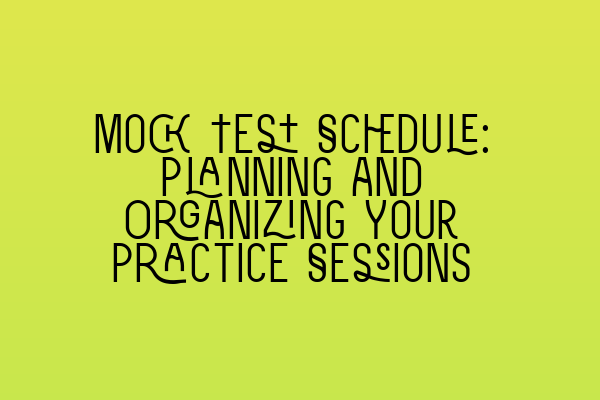Mock Test Schedule: Planning and Organizing Your Practice Sessions
If you’re preparing for the Solicitors Qualifying Examination (SQE), you know how important it is to practice and familiarize yourself with the material. One of the most effective ways to do this is by incorporating mock tests into your study routine. Mock tests not only help you gauge your understanding of the material but also simulate the exam environment, allowing you to build confidence and improve your performance. In this blog post, we’ll discuss the importance of a mock test schedule and how to plan and organize your practice sessions for optimal results.
The Importance of a Mock Test Schedule
A well-structured mock test schedule is essential for successful exam preparation. It helps you allocate time for practicing different areas of the syllabus, assess your progress, and identify gaps in your knowledge. By following a schedule, you’ll be able to create a routine that ensures consistent and targeted practice, which is key to maximizing your performance on the actual exam day.
So, how can you plan and organize your mock test schedule effectively? Let’s dive into the steps:
Step 1: Assess Your Syllabus
The first step in planning your mock test schedule is to assess the syllabus. Break it down into different topics or modules so you can allocate specific time slots for each one. Understanding the breadth and depth of the syllabus is crucial in determining how much time you should dedicate to practicing each area.
To ensure you cover all the necessary topics, you can refer to reliable study resources such as textbooks, online guides, or recommended study materials. These will provide you with a comprehensive overview of what you need to study and help you identify any additional resources you may require.
If you want to dive deeper into specific topics, you can check out our related articles:
- Joint Ownership: Legal Considerations for Co-Owners of Property
- Commercial Leases: Essential Insights for Business Premises
- Tenant Rights in the UK: Understanding Your Legal Protections
- Property Transactions and the Legal Process: A Comprehensive Guide
- Examining the Intricacies of Land Law in the UK
Step 2: Determine Your Mock Test Frequency
Once you have an understanding of the syllabus, the next step is to determine how frequently you should take mock tests. This will depend on the amount of time you have available before your exam, as well as your personal study preferences.
For example, if you have ample time to prepare, you can aim to take a mock test every week or every two weeks. This frequency allows you to pace your preparation and gives you enough time to review your performance and address any weaknesses identified. On the other hand, if you have limited time, you may need to increase the frequency to ensure you cover all areas adequately.
Step 3: Create a Mock Test Schedule
Now that you know the frequency of your mock tests, it’s time to create a schedule that incorporates these practice sessions into your study routine. Ideally, you should allocate dedicated time slots for mock tests, just as you would for any other study activity.
Consider your peak study hours and try to schedule mock tests during that time to simulate the exam conditions as closely as possible. This will help condition your mind and body to perform at their best during the actual exam.
Additionally, intersperse your mock tests with regular revision sessions to reinforce your understanding of the material. This combination of practice and revision will enhance your retention and ensure a comprehensive understanding of the syllabus.
Step 4: Analyze and Review Your Performance
After each mock test, take the time to analyze and review your performance. Look for areas where you performed well and areas where you struggled. By identifying your strengths and weaknesses, you can focus your future study sessions on the areas that need improvement.
Remember to keep track of your progress and use the results of your mock tests as a benchmark. This will help you gauge your improvement over time and identify any areas that require further attention.
Step 5: Adjust Your Schedule as Needed
Throughout your exam preparation journey, it’s important to remain flexible and adaptive. As you progress, you may realize certain topics require more or less practice than initially anticipated. This is normal, and it’s essential to adjust your mock test schedule accordingly.
Do not hesitate to modify your schedule to ensure you give ample attention to the areas that need it the most. Your mock test schedule should serve as a guide, not a rigid rule. The goal is to customize your practice sessions to suit your individual needs and optimize your learning.
Final Thoughts
A well-planned and organized mock test schedule is a powerful tool in your SQE exam preparation arsenal. It allows you to allocate time effectively, assess your progress, and identify areas for improvement. By incorporating regular mock tests into your study routine, you’ll be able to build confidence, improve your performance, and maximize your chances of success.

Leave a Reply